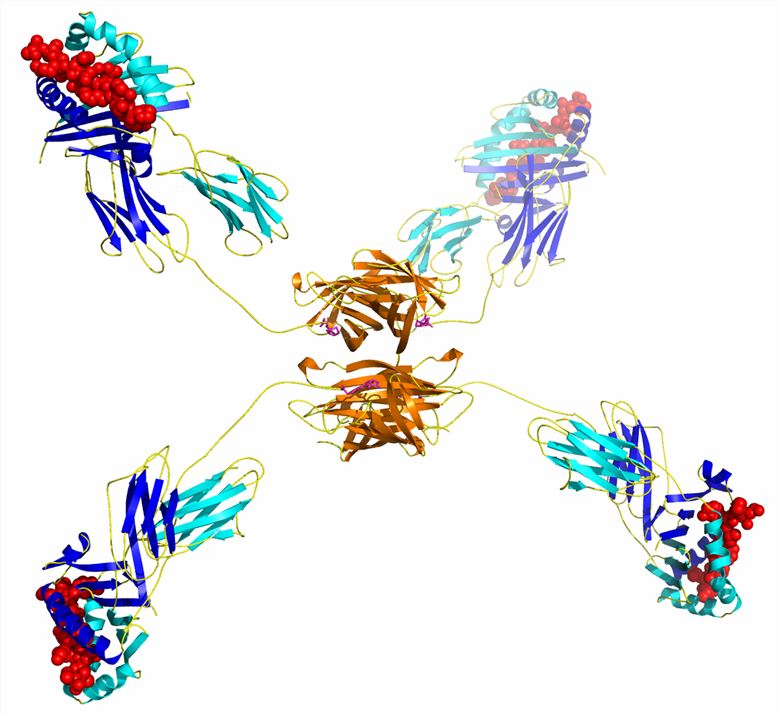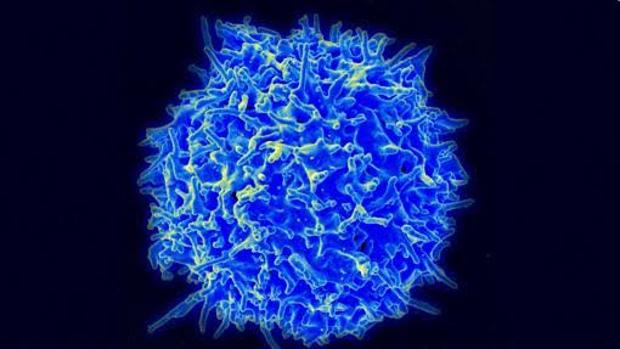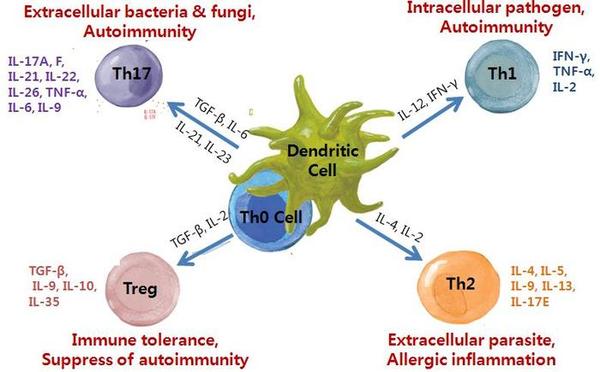
With our expertise in innovated cellular immunotherapy development for TCR modified T cell, Creative Biolabs is proud to offer the comprehensive MHC tetramer assays and customized portfolio for combined tetramer & functional assays.
The development of tetrameric MHC-peptide complexes has led to direct visualization, quantification and phenotypic characterization of antigen-specific T cells, which greatly enhances our ability to assess cellular dynamics during immune responses. Our proprietary combination services of MHC tetramer assays with functional analysis provide many novel insights into T cells, allowing researchers to investigate T cell life cycle, death patterns, and effector functions. In addition, our professional MHC service team is dedicated to developing technologies for generating multifunctional tetramers and designing customized solutions to meet customer demand for antigen-specific T cell research.
Creative Biolabs's MHC Tetramer Portfolio Includes:
The most common use of MHC-peptide tetramers in vaccinology is to simply track the frequency of circulating CD8+ or rarely CD4+ T cells. The key issues to be addressed here are the optimization and definition of background and cutoff, as well as the definition of positive response. However, our flow cytometry with multi-parameter detection enables gating strategies to improve some of these problems, including eliminating bimodal, eliminating dead cells and selecting cells with non-specific binding capabilities, such as B cells and monocytes.
Newly developed "empty" tetramers can be used to identify specific peptides from antigens, a process described as tetramer-directed epitope mapping (TGEM), which is commonly used for MHC class II molecules. Specific tetramers that give positive staining provide a population of T cells known to be MHC-restricted and antigen-specific, and can be sorted by fluorescence-activated cell sorting (FACS), allowing for phenotyping of cells and genotyping.

Measuring T cell expansion and longevity may be important to understand the dynamics of T cell responses and disease progression. We measured the proliferation of epitope-specific T cells by combining the widely used technique CFSE (carboxyfluorescein diacetate succinimidyl ester) with tetramer staining. For this assay, cells are first stained with tetramer then permeabilized and stained for proliferation markers or surface markers, followed by FACS analysis.
Tetramer staining after peptide stimulation combined with ICS (intracellular cytokine staining) has proven to be a robust and sensitive technique for analyzing T cells in response to viruses and vaccines. We perform tetramer staining and cytokine secretion profiling by ICS in one assay, and in parallel perform phenotypic analysis on unstimulated cells in vitro. Although this does not provide an analysis based on the function of the tetramer-binding cells on a per-cell basis, it does provide population-level information.
Our tetrameric services are not limited to ex vivo studies but they can be used to show the spatial relationship of antigen-specific CD8+ T cells in tissues to other intact cells, the so-called in IST staining. Fresh unfixed tissue is ideal for flexible binding of TCR to tetramer. Of note, this method is mainly used successfully in mouse models.
MHC tetramers are used to select functionally active epitope-specific cells, then expanding and transferring these cells to patients, so-called tetramer-directed "passive" immune or adoptive T cell transfer. We have developed MHC tetramer variants that can be radiolabeled to be coupled with toxins or cytokines (so-called "MHC-based immunotoxins/immune cytokines") and then injected into subjects to modulate or consume specific T cell populations.
Tetramers can be used in combination with cell sorting techniques for clonotype expression. Tetramer-stained cells can be sorted by FACS or using magnetic anti-ultraviolet microbeads to produce a high purity epitope-specific T cell population. These live unfixed cells are then used for functional analysis or RNA can be extracted for expression analysis, which will provide unprecedented rich information on the phenotype and function of epitope-specific T cells at the single cell level.

The MHC tetramer can be performed in conjunction with cytokine capture assay. To perform this assay, cells are incubated with the selected tetramer and then stimulated with the same on which the tetramer is constructed, after which the cells are labeled with a cytokine capture antibody. This method can significantly promote your phenotypic and functional studies.
We have developed a method to mix different tetramers with distinct fluorochromes (limited number of colors), and more different specificities can be detected simultaneously in the sample, which increases exponentially with color. This very novel technique has practical value in simultaneously monitoring different reactions in a single sample, and can greatly enhance the use of tetramers to track broader specificities of induced T-cell responses.
If you are interested in customized tetramers, we have a wealth of experience in building modified mutant tetramers. With custom-made MHC, the CD8/MHC binding interaction can be altered so that different TCR affinity T cell pools can be sampled separately. This technique is valuable in defining a sufficient affinity response to provide information about efficiency.
MHC Tetramer related portfolio assays are Creative Biolabs' MHC-based cell therapy proprietary service. Our experienced scientists will greatly facilitate you to achieve highly unmet needs, particularly in cell therapy. Please contact us for more information and a detailed quote.
For any technical issues or product/service related questions, please leave your information below. Our team will contact you soon.
All products and services are For Research Use Only and CANNOT be used in the treatment or diagnosis of disease.
 NEWSLETTER
NEWSLETTER
The latest newsletter to introduce the latest breaking information, our site updates, field and other scientific news, important events, and insights from industry leaders
LEARN MORE NEWSLETTER NEW SOLUTION
NEW SOLUTION
CellRapeutics™ In Vivo Cell Engineering: One-stop in vivo T/B/NK cell and macrophage engineering services covering vectors construction to function verification.
LEARN MORE SOLUTION NOVEL TECHNOLOGY
NOVEL TECHNOLOGY
Silence™ CAR-T Cell: A novel platform to enhance CAR-T cell immunotherapy by combining RNAi technology to suppress genes that may impede CAR functionality.
LEARN MORE NOVEL TECHNOLOGY NEW SOLUTION
NEW SOLUTION
Canine CAR-T Therapy Development: From early target discovery, CAR design and construction, cell culture, and transfection, to in vitro and in vivo function validation.
LEARN MORE SOLUTION

